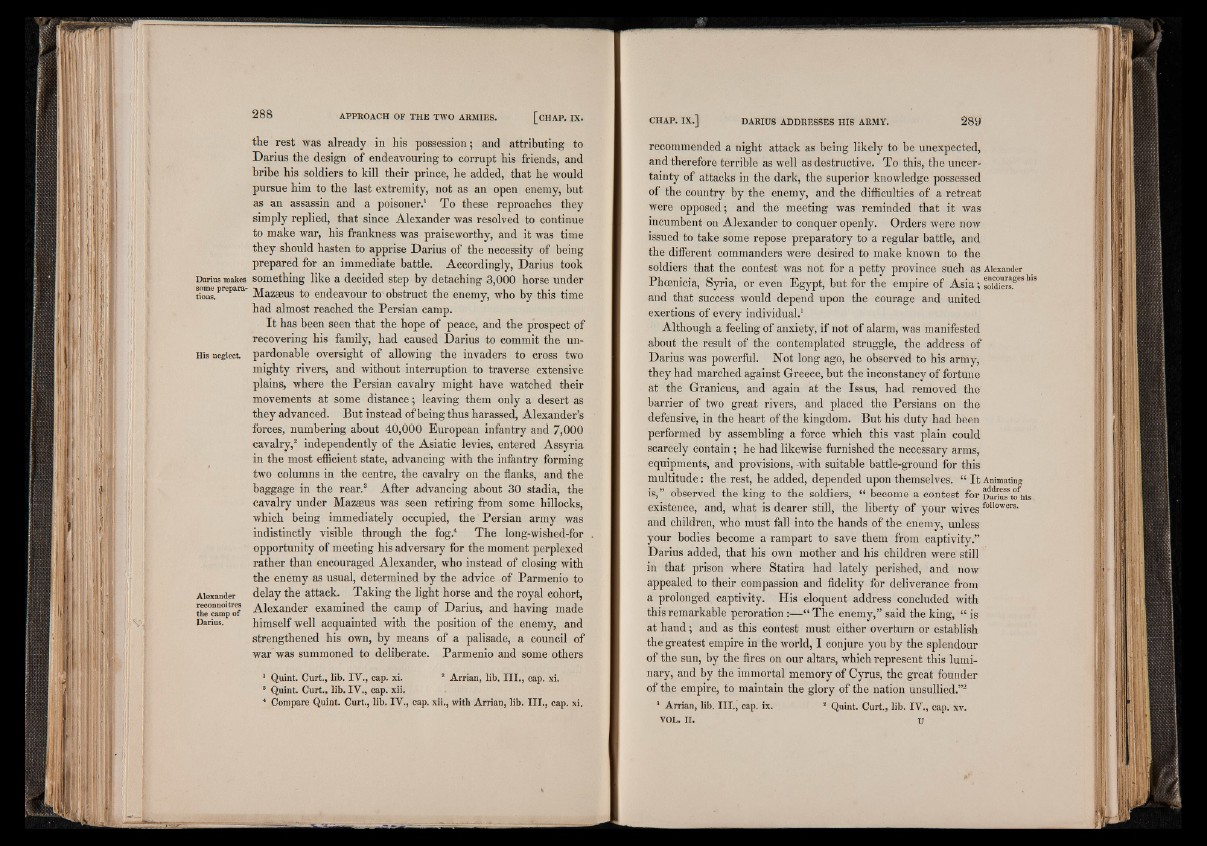
the rest was already in his possession; and attributing to
Darius the design of endeavouring to corrupt his friends, and
bribe his soldiers to kill their prince, he added, that he would
pursue him to the last extremity, not as an open enemy, but
as an assassin and a poisoner.1 To these reproaches they
simply replied, that since Alexander was resolved to continue
to make war, his frankness was praiseworthy, and it was time
they should hasten to apprise Darius of the necessity of being
prepared for an immediate battle. Accordingly, Darius took
Darius makes something like a decided step by detaching 3,000 horse under
tious.prepara" Mazaeus to endeavour to'obstruct the enemy, who by this time
had almost reached the Persian camp.
It has been seen that the hope of peace, and the prospect of
recovering his family, had caused Darius to commit the un-
His neglect pardonable oversight of allowing the invaders to cross two
mighty rivers, and without interruption to traverse extensive
plains, where the Persian cavalry might have watched their
movements at some distance; leaving them only a desert as
they advanced. But instead of being thus harassed, Alexander’s
forces, numbering about 40,000 European infantry and 7,000
cavalry,2 independently of the Asiatic levies, entered Assyria
in the most efficient state, advancing with the infantry forming
two columns in the centre, the cavalry on the flanks, and the
baggage in the rear.3 After advancing about 30 stadia, the
cavalry under Mazaeus was seen retiring from some hillocks,
which being immediately occupied, the Persian army was
indistinctly visible through the fog.4 The long-wished-for
opportunity of meeting his adversary for the moment perplexed
rather than encouraged Alexander, who instead of closing with
the enemy as usual, determined by the advice of Parmenio to
Alexander delay the attack. Taking the light horse and the royal cohort,
t h ^ m p of Alexander examined the camp of Darius, and having made
Darius. himself well acquainted with the position of the enemy, and
strengthened his own, by means of a palisade, a council of
war was summoned to deliberate. Parmenio and some others
* Quint. Curt., lib. IV ., cap. xi. s Arrian, lib. I I I . , cap. xi.
3 Quint. Curt., lib. IV ., cap. xii.
• Compare Quint. Curt., lib. IV., cap. xii., with Arrian, lib. I I I ., cap. xi.
recommended a night attack as being likely to be unexpected,
and therefore terrible as well as destructive. To this, the uncertainty
of attacks in the dark, the superior knowledge possessed
of the country by the enemy, and the difficulties of a retreat
were opposed; and the meeting was reminded that it was
incumbent on Alexander to conquer openly. Orders were now
issued to take some repose preparatory to a regular battle, and
the different commanders were desired to make known to the
soldiers that the contest was not for a petty province such as Alexander
Phoenicia, Syria, or even Egypt, but for the empire of Asia; soldiers?68 **
and that success would depend upon the courage and united
exertions of every individual.1
Although a feeling of anxiety, if not of alarm, was manifested
about the result of the contemplated struggle, the address of
Darius was powerful. Not long ago, he observed to his army,
they had marched against Greece, but the inconstancy of fortune
at the Granicus, and again at the Issus, had removed the
barrier of two great rivers, and placed the Persians on the
defensive, in the heart of the kingdom. But his duty had been
performed by assembling a force which this vast plain could
scarcely contain ; he had likewise furnished the necessary arms,
equipments, and provisions, -with suitable battle-ground for this
multitude: the rest, he added, depended upon themselves. “ It Animating
is,” observed the king to the soldiers, “ become a contest for Darius8 tohis
existence, and, what is dearer still, the liberty of your wivesfoIlowers-
and children, who must fall into the hands of the enemy, unless
your bodies become a rampart to save them from captivity.”
Darius added, that his own mother and his children were still
in that prison where Statira had lately perished, and now
appealed to their compassion and fidelity for deliverance from
a prolonged, captivity. His eloquent address concluded with
this remarkable peroration:—£ The enemy,” said the king, “ is
at hand; and as this contest must either overturn or establish
the greatest empire in the world, I conjure you by the splendour
of the sun, by the fires on our altars, which represent this luminary,
and by the immortal memory of Cyrus, the great founder
of the empire, to maintain the glory of the nation unsullied.”2
1 Arrian, lib. III., cap. ix. 3 Quint. Curt., lib. IV., cap. xv.
VOL. II. u